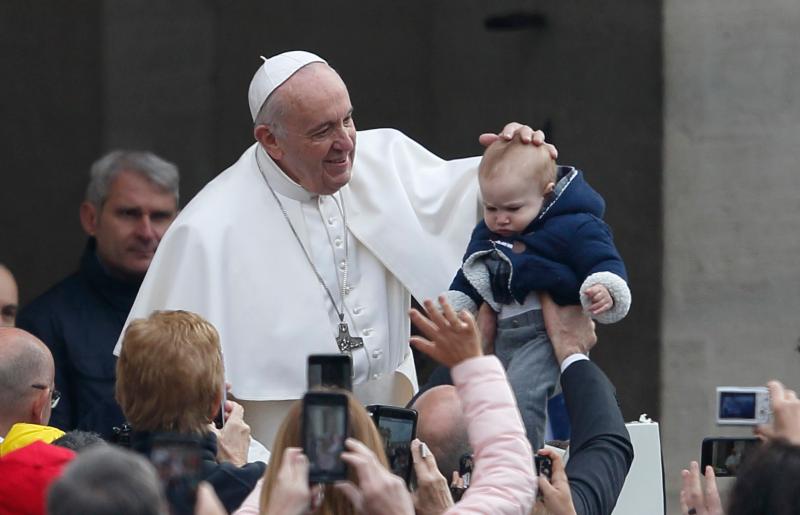
Pope Francis greets a baby during his general audience in St. Peter’s Square at the Vatican April 3, 2019. (CNS photo/Paul Haring)
VATICAN CITY (CNS) — No one should be afraid that God has allowed there to be different religions in the world, Pope Francis said.
“But we should be frightened if we are not doing the work of fraternity, of walking together in life” as brothers and sisters of one human family, he said.
(See a related video.)
As is customary, at his general audience April 3, the first after his March 30-31 trip to Morocco, Pope Francis reviewed his visit.
“People might ask themselves, ‘Why is it the pope visits Muslims and not just Catholics?'” the pope said.
[hotblock]
Catholics and Muslims are both “descendants of the same father, Abraham,” he said, and the trip was another step on a journey of “dialogue and encounter with (our) Muslim brothers and sisters.”
The pope said he wanted to follow in the footsteps of two great saints: St. Francis of Assisi, who brought a “message of peace and fraternity” to Sultan al-Malik al-Kami 800 years ago, and St. John Paul II, who visited Morocco in 1985.
Pope Francis said people also may wonder why God allows there to be so many different religions in the world.
Some theologians say it is part of God’s “permissive will,” allowing “this reality of many religions. Some emerge from the culture, but they always look toward heaven and God,” the pope said.
“What God wants is fraternity among us,” he said, which is why “we must not be frightened by difference. God has allowed this.” But it is right to be worried when people are not working toward a more fraternal world, he added.
[tower]
The pope’s comment about God’s “voluntas permissiva” or “permissive will” clarified a controversy that erupted during the pope’s trip in February to Abu Dhabi, United Arab Emirates.
He and Sheikh Ahmad el-Tayeb — a leading authority for many Sunni Muslims, signed a document on human fraternity that said, “The pluralism and the diversity of religions, color, sex, race and language are willed by God in his wisdom, through which he created human beings.”
In his audience talk April 3, the pope clarified that God did not create religious diversity, but rather allows it to happen, as he created human beings who possess free will.
During the general audience, the pope also spoke about the many encounters and events during the two-day trip, making special mention of his visit with migrants — some of whom told him how their lives only became “human” again when they found a community that welcomed them as human beings.
“This is key,” the pope said.
The Vatican supported the Global Compact for Safe, Orderly and Regular Migration, which was adopted by the majority of U.N. member states at a conference in Morocco in December, so that the international community could strengthen an approach that focused on welcoming, protecting, promoting and integrating migrants.
“It’s not about assistance programs coming down from ‘on-high'” but about everyone working together “to build cities and countries that, even preserving their respective cultural and religious identities, are open to differences and know how to see their value” as part of a sign of human fraternity.
[hotblock2]
Reading from his prepared text about the church’s work with migrants, the pope looked up at the people in the square and said that, in all honesty, “I do not like to say, ‘migrants,'” preferring to say, “people who migrate.”
“We have fallen into a culture of adjectives. We use so many adjectives and sometimes we forget the substantive,” that is, the noun or “the substance,” he said.
When talking about people, it is better to remember the adjective should always go with a noun, “a person,” he said.
“That way there is respect and no falling into this culture of adjectives that is too fluid, too airy” and lacking substance, he said.
PREVIOUS: Papal document addresses challenges of evangelizing in the digital age
NEXT: South Sudan’s leaders will head to Vatican for meetings, retreat


Share this story